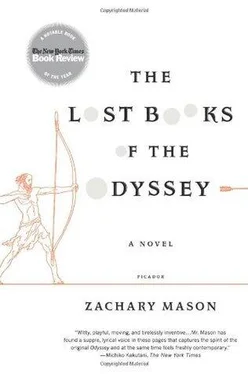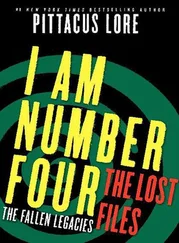A fog came down on them just as they were bringing up their battering ram — on that much, everyone afterwards agreed. From there, the stories diverged. Some spoke of stumbling out of the fog onto an endless plain of frost where they wandered for days without seeing any evidence of living things except, sometimes, their own footprints. Some found a palace woven of giant bones from which rushed grey warriors with grim faces who shrugged off even the cruelest blows. Others spoke of a grey devil sitting on a stone who sang dirges in answer to their shouted questions.
Many Greeks died in battle but some of them came back to take their places in line with the living, their wounds still open but no longer bleeding. Menelaus did not like it but he did not fall short of men. Sometimes Death’s army sallied forth from Ilium, full of rage, but their passion was quickly spent and often his soldiers would stop in the middle of battle as though transfixed by a sudden inspiration, their gazes fixed on the horizon, motionless, even as the rejoicing, vindictive Greeks hacked them to pieces.
The high walls of Death’s city became the ubiquitous background of the Greeks’ dreams. There was a universal sense of oppression to which only Menelaus was immune — he fought with delighted abandon, never giving ground, always attacking. He would face a thicket of spears alone if his men’s courage failed, but he was never wounded or even tired. His tent was the only one in camp from which laughter was heard and his recklessness and apparent contempt for his enemy gave heart to his soldiers. Agamemnon strove to follow his brother’s example, and though he could not be as careless he fought valiantly against the soldiers of Death — he cursed and roared, hacked through cold flesh, caught them and bound them and burned them in pits.
As for Odysseus, Quickness carried him. When he was a child he had seen her frequently — she had played games with him in the woods behind his father’s house and instructed him in the use of the bow. She had been more reticent since he had grown up, only appearing to him when he killed his first man and once after five days of fasting. Now he could always feel her with him, hovering nearby him in battle, turning aside arrows and stones, whispering in his ear when to push the attack and when to flee. One night as he resharpened his sword, dull from hacking through the stiffened sinews of the dead, he asked her why, since she protected him, she did not commit herself fully and blast his enemies with lightning? She said nothing but he could feel her amusement and had the sense that she was biding her time.
The war dragged on. Clouds hid the sun for months at a time and the warriors’ tanned faces turned pale. Not all the apparitions were enemies — Agamemnon swore that when he had been cornered by Ilium’s gates his long-dead great-grandfather had appeared, hefted his old boar-spear and laughed while he spitted the menacing ghouls. Menelaus lost weight and there were black rings under his eyes but he never faltered in his singularity of purpose. As for Odysseus, he woke one morning to a strange sound — he went into the tent next to his and found Karéte, a second cousin on his mother’s side, alabaster pale and drawing each bubbling breath through a long gash in his throat (which had been made by a left-hander, some part of Odysseus’s mind noted, and a strong one). The cut was not bleeding and Karéte turned restlessly in his sleep. Odysseus went back to his tent, lit a stick of incense before Quickness’s idol and begged her to show him how to end the war.
She answered instantly, as though she had been waiting for him to ask. He heard her out and for the first time presumed to argue with her, but she would not be moved.
He duly went to the black tree before Ilium’s gates. Standing on a stone, he tied a rope to its lowest branches, knotted it around his neck, closed his eyes, and, commending his soul to Quickness, jumped. Though he had surreptitiously frayed the rope in hopes of it breaking, it held, and darkness overtook him. When he came to, it was night and he lay on the ground beneath the tree wearing a torque of rope. Ilium’s gates hung open and he stole silently in.
Within the walls of the dead city all was still though the night was full of tension. Now and then high falsetto singing drifted up through sewer grates and he quickened his pace, soon coming to the center of the city where Death’s dour palace loomed. It had high windows but no doors and its seamed facade reminded Odysseus of a mouth sewn shut.
He climbed up one of the cracks in its face to a small window just wide enough to squeeze through. He could see nothing of the dark room within but heard a faint whispering. He dangled by his hands and let himself fall into blackness, landing heavily and scrambling up, groping blindly, finding nothing. The room felt empty, like an abandoned warehouse, but as his eyes adjusted he made out a tall black throne beside which Helen sat on a footstool. Odysseus tugged at the rope around his neck and knelt before her in the gloom (noticing with a twinge that her beauty had not dimmed), begging her to leave with him and end the awful war but she barely seemed to see him, continuing a low monologue (this was the whispering he had heard) about the vast night of Paris’s eyes and how he, ever the gentleman, had not yet touched her, though she had wanted him to. Odysseus cajoled and reasoned. He pled for his life and the lives of all the Greeks, her kinsmen among them. He revealed the command he had been given by Quickness, who was implacable. But she did not attend and Odysseus, exasperated, full of horror and rage, drew his sword, pulled her head back by the hair and cut her throat. He threw down the sword, the clang as it hit the ground obscene in such a quiet place, and staggered away.
Paris stepped forward (he had always been there, Odysseus realized, but unseen) and gently picked up her body. As he held her she spasmed and drew a long shuddering breath. In that moment Quickness appeared with a feral hateful grin and fell upon Death with a howl. She crushed him close and wrapped her strong white fingers around his throat and in the moment before they disappeared Odysseus saw dismay on Death’s face. Though Quickness was gone, her war-cry echoed in the dismal hall. Odysseus fled then, getting a last glimpse of Helen crawling slowly away, leaving a trail of bloody hand-prints behind her.
There was a door to the outside that he hadn’t seen before. He ran through it and straight to the unguarded city gates. He threw them open and called out to Menelaus to come and get his revenge if he wanted it. Menelaus and Agamemnon came running, eyes blazing, their army close behind, and rushed into the city. The listless dead pulled themselves out of the vaults and sewers to resist them but with Paris gone the defence was apathetic and the Greeks carved through them with élan.
In the uncountable mausoleums were many funerary offerings, among them jars of strong wine, and even before victory was certain the soldiers were drunk, mouths stained red, draping themselves in rotten thousand-year-old finery and pausing in their bloody work to chase after the marmoreally cold empty-eyed girls who watched from alleyways. For all that, the Greeks soon broke their enemies and built a great fire in Ilium’s square to burn them.
Before the bonfire Menelaus declared to his cheering men that Paris was dethroned, that Ilium would be razed and a new city built over its ruins. He would anoint himself the new king, break Death’s dominion and open the kingdom of shadows to the sun. He went to Death’s palace to get Helen but found only sticky red hand-prints and an overturned stool.
When all Paris’s soldiers had been turned to ash, Menelaus did as he had sworn and took Death’s throne. His commands rang through the onyx halls of Ilium and though the soldiers could have gone home then, every man chose to stay, except Agamemnon, who made a short trip back to Greece to see his wife. *
Читать дальше












